
 In today’s world, electronic screens are everywhere — from TVs and smartphones to tablets and games consoles. Even our youngest children are growing up in increasingly digital environments. While technology brings many conveniences, intentionally unplugging can offer profound benefits for little ones and their families. Whether it’s for a day, a weekend, a holiday, or even longer, the value gained from a ‘digital detox’ may surprise even the most dubious amongst us. Today’s post investigates.
In today’s world, electronic screens are everywhere — from TVs and smartphones to tablets and games consoles. Even our youngest children are growing up in increasingly digital environments. While technology brings many conveniences, intentionally unplugging can offer profound benefits for little ones and their families. Whether it’s for a day, a weekend, a holiday, or even longer, the value gained from a ‘digital detox’ may surprise even the most dubious amongst us. Today’s post investigates.
What Science Tells Us
 Research consistently shows the positive effects of stepping away from our screens. Studies report that a digital detox can lead to decreased stress and anxiety, improved mood and well-being, and even better physical health through healthier, less sedentary, lifestyles. Pausing the use of electronic screens can even help reset our perception of time, making days feel longer, fuller, and more engaged.
Research consistently shows the positive effects of stepping away from our screens. Studies report that a digital detox can lead to decreased stress and anxiety, improved mood and well-being, and even better physical health through healthier, less sedentary, lifestyles. Pausing the use of electronic screens can even help reset our perception of time, making days feel longer, fuller, and more engaged.
For children, excessive screen use, especially before bedtime, can disrupt sleep. This is caused by electronic screens interfering with natural melatonin production, leading to delayed sleep onset and poor quality rest. It can also slow language development and impair attention, particularly for children under five, whose brains are undergoing rapid early development. In one study, toddlers watching three hours of TV a day were three times more likely to experience language delays and weaker school readiness skills.
The results from combined studies indicate that children who reduce screen time show fewer emotional difficulties, improved social behaviour, and greater prosocial tendencies including kindness and cooperation. In another real-world experiment, teens who took a 48-hour smartphone break noticed better sleep, more outdoor activity and stronger family interactions.
Learn more about the science of ‘green time vs. screen time’ here.
Why It Matters for Families
 When families go screen-free, the benefits extend well beyond the individual. Removing screens often rekindles face-to-face interactions and facilitates more laughter and unfiltered conversations within the family. Parents who’ve tried it report a renewed sense of connection and deeper engagement with their children. Even short periods of unplugging can turn into lasting changes—more shared stories, more creative play, and more real presence.
When families go screen-free, the benefits extend well beyond the individual. Removing screens often rekindles face-to-face interactions and facilitates more laughter and unfiltered conversations within the family. Parents who’ve tried it report a renewed sense of connection and deeper engagement with their children. Even short periods of unplugging can turn into lasting changes—more shared stories, more creative play, and more real presence.
Outdoor time plays a huge role too. Whether it’s a neighbourhood walk, a garden adventure, or imaginative forest-based play, nature helps cultivate curiosity, resilience and emotional regulation. Studies suggest that just 20 minutes spent in nature can make children significantly happier and help them learn to cooperate and handle challenges — all skills rarely honed by flicking through a screen. Similarly, nature-rich breaks support mental health and reduce the pull of addictive screen use. Studies found that even a view of a natural green space can enhance academic focus and grades — incredible! Learn more about how spending time closer to nature benefits children here.
Children’s emotional intelligence also deepens with the absence of screens as it encourages them to observe and interpret others’ feelings. For example, in a five-day unplugged camp, participants improved significantly in their ability to recognise emotional expressions, unlike peers who continued using devices.
Benefits Families Are Likely to Notice
After just one screen-free day, many families may notice:
 Better sleep for everyone with children tending to drop off more easily and adults feeling more rested.
Better sleep for everyone with children tending to drop off more easily and adults feeling more rested.- Evenings that are likely to feel longer and more relaxed.
- Greater spontaneity and creativity as children talk, play, read, draw, and excitedly ask “What shall we do next?”
- Enhanced awareness of each other’s company, with siblings rediscovering play together and children becoming more attentive to parents.
- A pleasant atmosphere overall and a likely boost to everyone’s mood.
Possible Challenges & Their Solutions
Of course, removing electronic screens may not always be easy, especially at first. Families trying a digital detox may face some potential challenges. If so, there are gentle ways to manage them.
If children are resistant to the idea or complain that it’s going to be boring without electronic screens, try re-framing the break as an adventure rather than a restriction. Invite children to suggest activities — let them decide during the detox. Try presenting it as a shared family challenge rather than a rule.
Adults may worry about missing their devices too. However, parents modelling the detox by putting their own phones away will help children accept it too.
There is also the potential fear of missing out (FOMO) without access to electronic devices and social connections — particularly for older children. However, explaining that it’s just for a short time will help achieve acceptance of the idea. Acknowledge the temporary interference and encourage children to choose family connection and creativity first — it will help families stay on track.
There is the potential of failure if preparations have not been made before starting. So, in readiness, it’s advisable to prepare a list of screen-free ideas so the family can hit the ground running when they begin their digital detox (see suggestion #3 below).
How to Introduce a Detox Gently & Keep It Fun
Here are some tips to help ease families into a digital detox and set them up for success:
 Begin by designating screen-free boundaries, such as bedrooms or mealtimes, and/or set a daily screen-free hour in the evening.
Begin by designating screen-free boundaries, such as bedrooms or mealtimes, and/or set a daily screen-free hour in the evening.- Get children to buy into the idea by inviting them to help set the rules. Ask them “When are screens off?” and “What happens then?” They can be nudged in the right direction through discussion and helpful suggestions if they’re unsure.
- Plan those entertaining and engrossing alternatives together. Screen-free ideas could include reading together, making simple crafts, telling stories, going outdoors, cooking, playing music, dancing and fitness sessions, baking together, garden safaris, yoga sessions, board games — and so on.
- Celebrate small wins! For example, point out how much deeper and more restful sleep is, or how much more chatter there is at the breakfast table.
- Once screen-free moments become familiar, try graduating your family to a screen-free weekend or even a full holiday. Many families describe these as revelatory with any initial frustrations soon giving way to something deeper and more rewarding.
Final Thoughts
 The evidence clearly shows: families who have periods free of electronic screens will benefit. A digital detox enriches and elongates days. It enhances sleep quality for children and adults by facilitating their natural rhythms. Days feel more spacious and calm without digital distractions and imaginative play soon steps in and thrives. In the absence of screens, children are also likely to get outdoors more often — and benefit from everything nature and outdoor play have to offer. Mental health and even academic grades are also likely to improve when this happens.
The evidence clearly shows: families who have periods free of electronic screens will benefit. A digital detox enriches and elongates days. It enhances sleep quality for children and adults by facilitating their natural rhythms. Days feel more spacious and calm without digital distractions and imaginative play soon steps in and thrives. In the absence of screens, children are also likely to get outdoors more often — and benefit from everything nature and outdoor play have to offer. Mental health and even academic grades are also likely to improve when this happens.
A digital detox isn’t about rejecting technology, though, as it has its place; it’s more about creating balance and discovering what’s been hidden. For example, deeper conversations, creative play, richer bonds, and nourishing rest. Whether it’s a screen-free Sunday, a tech-free teatime, or a weekend getaway without devices, these breaks can evolve into high-quality, cherished family time. Although at its heart a digital detox is the most simple of concepts, it’s likely to enhance family life in profound ways, whether for an afternoon or longer term.
With all that in mind, why not invite your child(ren) to get started by trying a screen-free afternoon this weekend? It could be the first step towards more fun, enhanced well-being, greater fulfilment and more genuine togetherness.
A Nursery Place for Your Child in Streatham

 Today’s post was brought to you by Little Cedars Nursery, a highly-popular childcare provider in Streatham, close to Streatham Hill and Streatham Common. Catering for babies, toddlers, and preschoolers under five, it offers high-quality weekday childcare virtually all year round and has a great Ofsted rating. We also support funded childcare places for eligible children as young as just 9 months of age. Families living in Tooting, Furzedown, Balham, Norbury and Colliers Wood may also find Little Cedars Nursery convenient.
Today’s post was brought to you by Little Cedars Nursery, a highly-popular childcare provider in Streatham, close to Streatham Hill and Streatham Common. Catering for babies, toddlers, and preschoolers under five, it offers high-quality weekday childcare virtually all year round and has a great Ofsted rating. We also support funded childcare places for eligible children as young as just 9 months of age. Families living in Tooting, Furzedown, Balham, Norbury and Colliers Wood may also find Little Cedars Nursery convenient.
Start your exploration of a Little Cedars nursery place for your baby, toddler, or preschooler today. Please choose a button to get started:

 Better sleep for everyone with children tending to drop off more easily and adults feeling more rested.
Better sleep for everyone with children tending to drop off more easily and adults feeling more rested. Begin by designating screen-free boundaries, such as bedrooms or mealtimes, and/or set a daily screen-free hour in the evening.
Begin by designating screen-free boundaries, such as bedrooms or mealtimes, and/or set a daily screen-free hour in the evening.











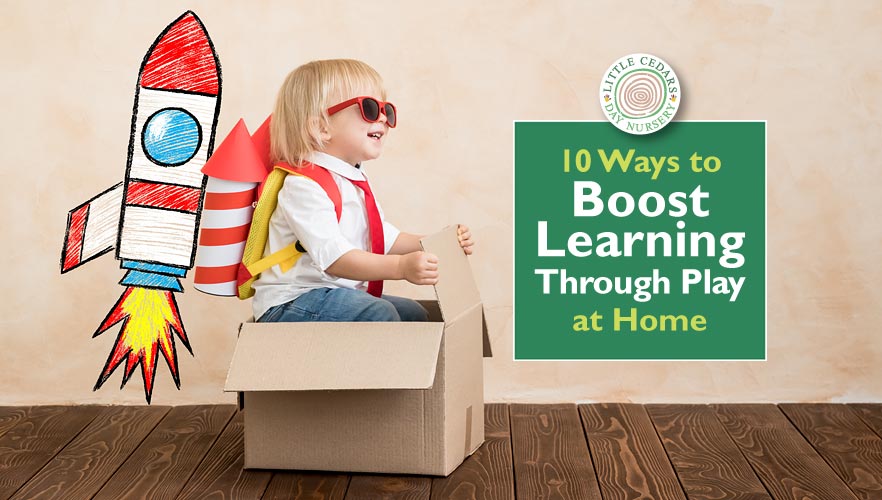
 As we previously reported,
As we previously reported,  One of the ways you can optimise the success of any indoor play is to set aside a dedicated and safe play area or room for your child. Here, you can ensure that children have the space and tools available for stimulating play when needed, and quieter play at other times. Age-appropriate toys, books, and equipment are, of course, the first prerequisite for such an area. However, you may also consider other elements such as a quiet storytelling/reading corner, a play den or teepee, a relaxation area with cushions and blankets, a creative section with art and craft supplies, a play kitchen or play tools section, and so on. Giving your child such a space is sure to encourage them to immerse themselves in their play activities. And, as we know, children learn best through play.
One of the ways you can optimise the success of any indoor play is to set aside a dedicated and safe play area or room for your child. Here, you can ensure that children have the space and tools available for stimulating play when needed, and quieter play at other times. Age-appropriate toys, books, and equipment are, of course, the first prerequisite for such an area. However, you may also consider other elements such as a quiet storytelling/reading corner, a play den or teepee, a relaxation area with cushions and blankets, a creative section with art and craft supplies, a play kitchen or play tools section, and so on. Giving your child such a space is sure to encourage them to immerse themselves in their play activities. And, as we know, children learn best through play. As well as giving children the tools for imaginative and educational play at home, your proactive input will also boost the benefits they receive from such activities. So, get involved, lead them sometimes and at other times let them lead. They’ll discover and learn more in this way. Ask and answer questions, encourage them to be creative in their thinking and physical approach and highlight aspects and elements that they may not otherwise have been aware of. Such an approach can teach children so much. It may well also deepen the bond between you.
As well as giving children the tools for imaginative and educational play at home, your proactive input will also boost the benefits they receive from such activities. So, get involved, lead them sometimes and at other times let them lead. They’ll discover and learn more in this way. Ask and answer questions, encourage them to be creative in their thinking and physical approach and highlight aspects and elements that they may not otherwise have been aware of. Such an approach can teach children so much. It may well also deepen the bond between you. There are many types of play at home that can involve role-play, which is a powerful tool for learning. Role-play allows children to immerse themselves deeply into the game, story, or scenario they are acting out. As such it greatly boosts young imaginations and stimulates creativity skills. So, encourage such activities as dressing up in costumes, acting, and putting on pretend voices to embody characters. You and your child can take this a step further through the setting up of play equipment or props to create a new play scenario, for example, a play den, cave, pretend kitchen, or castle. Children will have immense fun whilst also learning huge amounts from such creative and imaginative activities.
There are many types of play at home that can involve role-play, which is a powerful tool for learning. Role-play allows children to immerse themselves deeply into the game, story, or scenario they are acting out. As such it greatly boosts young imaginations and stimulates creativity skills. So, encourage such activities as dressing up in costumes, acting, and putting on pretend voices to embody characters. You and your child can take this a step further through the setting up of play equipment or props to create a new play scenario, for example, a play den, cave, pretend kitchen, or castle. Children will have immense fun whilst also learning huge amounts from such creative and imaginative activities. Role-playing can also be brought into time spent reading with your child.
Role-playing can also be brought into time spent reading with your child. 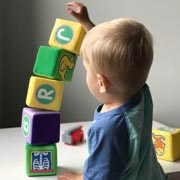 While electronic screens have their occasional place in the education and entertainment of families, it’s healthy to ensure your child has regular screen-free time. Partaking in active play at home — rather than staring inactively at a screen — can only be a good thing, in so many ways. Social skills will be better when children are actively involved in physical play with others. Motor skills and fitness will also benefit. Creativity levels will go through the roof too when children play in real life. They will also learn so much about the world, everything around them and the endless possibilities available to them by playing in the real world. Ensuring children get access to such benefits and opportunities by switching off smartphones, TVs, tablets and game consoles is something every parent can easily do for their child. Doing so will allow for more traditional play, which will enrich their lives in an infinite number of ways.
While electronic screens have their occasional place in the education and entertainment of families, it’s healthy to ensure your child has regular screen-free time. Partaking in active play at home — rather than staring inactively at a screen — can only be a good thing, in so many ways. Social skills will be better when children are actively involved in physical play with others. Motor skills and fitness will also benefit. Creativity levels will go through the roof too when children play in real life. They will also learn so much about the world, everything around them and the endless possibilities available to them by playing in the real world. Ensuring children get access to such benefits and opportunities by switching off smartphones, TVs, tablets and game consoles is something every parent can easily do for their child. Doing so will allow for more traditional play, which will enrich their lives in an infinite number of ways.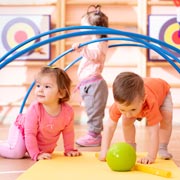 Toys that allow open-ended play are the toys that young children will usually learn the most from. For example, allowing your child to play with building blocks and materials for arts and crafts will let your child’s imagination run riot. Through these, they will be able to create an infinite range of scenarios and possibilities. Dolls and action figures are also good examples that will allow children to immerse themselves in open-ended play, with you there to help expand those possibilities, scenarios and learning opportunities even further.
Toys that allow open-ended play are the toys that young children will usually learn the most from. For example, allowing your child to play with building blocks and materials for arts and crafts will let your child’s imagination run riot. Through these, they will be able to create an infinite range of scenarios and possibilities. Dolls and action figures are also good examples that will allow children to immerse themselves in open-ended play, with you there to help expand those possibilities, scenarios and learning opportunities even further.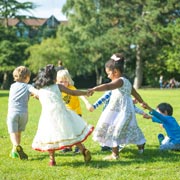 It doesn’t have to be just you and your child playing. Siblings and your child’s peers can also be encouraged to join in. Consider inviting your little one’s friends to your home or local park for a play date. Getting your child’s friends and peers together for group play will allow your child to learn and hone social skills like cooperation, teamwork, leadership, sharing and potentially even conflict resolution. And, with you there to oversee the group session, you can be sure that home play will be fulfilling, organised, fair and rewarding for all who take part.
It doesn’t have to be just you and your child playing. Siblings and your child’s peers can also be encouraged to join in. Consider inviting your little one’s friends to your home or local park for a play date. Getting your child’s friends and peers together for group play will allow your child to learn and hone social skills like cooperation, teamwork, leadership, sharing and potentially even conflict resolution. And, with you there to oversee the group session, you can be sure that home play will be fulfilling, organised, fair and rewarding for all who take part. Remember that you can facilitate learning through play outdoors with your child too. Whether in the garden, park or countryside, playing outdoors gives children a vast number of learning opportunities — and it’s great fun! By accompanying children outdoors, they can naturally explore and discover — and enjoy doing so in ways that are much more free than when playing indoors. Outdoor play is a feast for the senses, it will encourage the honing of physical skills like balance, coordination, motor skills and strength as well as fitness. Playing in the natural world is also incredibly good for children’s mental well-being and holistic development. Learn more about
Remember that you can facilitate learning through play outdoors with your child too. Whether in the garden, park or countryside, playing outdoors gives children a vast number of learning opportunities — and it’s great fun! By accompanying children outdoors, they can naturally explore and discover — and enjoy doing so in ways that are much more free than when playing indoors. Outdoor play is a feast for the senses, it will encourage the honing of physical skills like balance, coordination, motor skills and strength as well as fitness. Playing in the natural world is also incredibly good for children’s mental well-being and holistic development. Learn more about 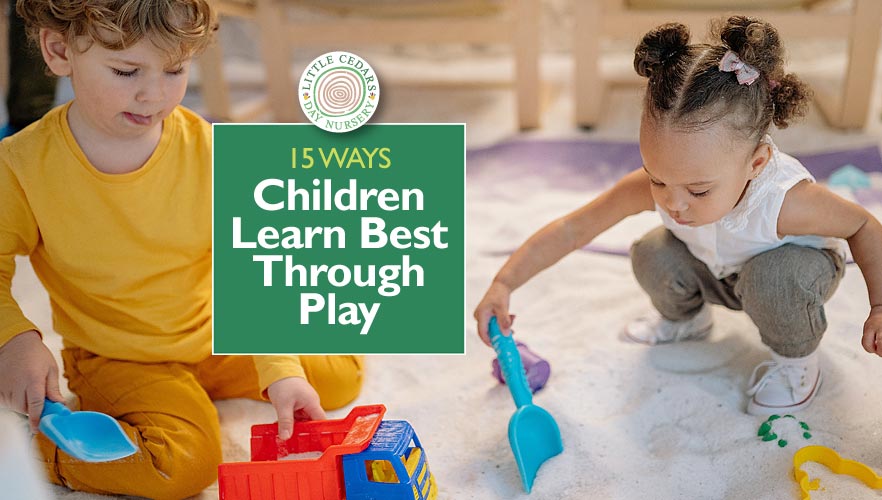
 Watch any infant, toddler or preschooler for just a few minutes and you’ll see that one thing comes naturally to them; play. Indeed, it’s as if they’ve been programmed that way, with the need to play coming instinctively to youngsters, whatever their species. Aside from it simply being great fun, there are a multitude of very good reasons for that — play teaches them an enormous amount about each other, themselves, other living things, cause and effect, and the world around them. It also allows them to learn and fine-tune a whole swathe of new skills as they grow older, play new games, and become more experienced. Add in some careful steering and nurturing during that play from Mum or Dad and they have a real recipe for success. With that in mind, we look today at the key ways in which learning through play profoundly benefits children.
Watch any infant, toddler or preschooler for just a few minutes and you’ll see that one thing comes naturally to them; play. Indeed, it’s as if they’ve been programmed that way, with the need to play coming instinctively to youngsters, whatever their species. Aside from it simply being great fun, there are a multitude of very good reasons for that — play teaches them an enormous amount about each other, themselves, other living things, cause and effect, and the world around them. It also allows them to learn and fine-tune a whole swathe of new skills as they grow older, play new games, and become more experienced. Add in some careful steering and nurturing during that play from Mum or Dad and they have a real recipe for success. With that in mind, we look today at the key ways in which learning through play profoundly benefits children. Play and creativity go hand-in-hand. Whether making up a new game, role-playing, constructing, or playing in a den, children will naturally create both scenarios and physical items as part of their play. Such activities teach them how to use their imaginations and to be creative — in a myriad of ways.
Play and creativity go hand-in-hand. Whether making up a new game, role-playing, constructing, or playing in a den, children will naturally create both scenarios and physical items as part of their play. Such activities teach them how to use their imaginations and to be creative — in a myriad of ways.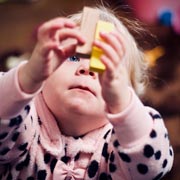 Different play activities require different types of movement and physical interaction from children. Indeed, this is a fundamental aspect of play. Whether jumping and running with large movements or carefully constructing with small items like building blocks, children will naturally hone both fine and gross motor skills during play. Such physical skills are essential to their ability to navigate and interact with the world around them and, in the most natural of ways, play is at the heart of enhancing those abilities.
Different play activities require different types of movement and physical interaction from children. Indeed, this is a fundamental aspect of play. Whether jumping and running with large movements or carefully constructing with small items like building blocks, children will naturally hone both fine and gross motor skills during play. Such physical skills are essential to their ability to navigate and interact with the world around them and, in the most natural of ways, play is at the heart of enhancing those abilities. Social skills are also improved through play. Children naturally play with other children and, by so doing, will soon pick up social skills as they begin to better understand social protocols that allow them to succeed both as individuals and in groups. Decent manners, saying please and thank you, cooperation, teamwork and closer bonding are all examples of social skills that can benefit through group play. Other examples include conflict resolution, better sharing, negotiation and communication, which we’ll come to next.
Social skills are also improved through play. Children naturally play with other children and, by so doing, will soon pick up social skills as they begin to better understand social protocols that allow them to succeed both as individuals and in groups. Decent manners, saying please and thank you, cooperation, teamwork and closer bonding are all examples of social skills that can benefit through group play. Other examples include conflict resolution, better sharing, negotiation and communication, which we’ll come to next. Through all this play, children will be communicating with each other and with any adults that are supervising. As such, play is a great facilitator of communication. Indeed, good communication is essential to most games and, through it, children can cooperate and achieve in ways that will help them in both the short term and into adulthood. Improving communication skills is also a fundamental way to improve success when you think about it.
Through all this play, children will be communicating with each other and with any adults that are supervising. As such, play is a great facilitator of communication. Indeed, good communication is essential to most games and, through it, children can cooperate and achieve in ways that will help them in both the short term and into adulthood. Improving communication skills is also a fundamental way to improve success when you think about it. Mathematics is often embedded into games and pastimes. Children can learn, for example, about adding, subtracting, multiplication and division through games. Even dividing group play into teams requires some fundamental maths to ensure teams are equal in size. Building towers out of blocks is another great example where children can count how many blocks they can stack into a tower before it falls over. They can try to beat their own maximum, or even compete against one another to see who can use the most blocks.
Mathematics is often embedded into games and pastimes. Children can learn, for example, about adding, subtracting, multiplication and division through games. Even dividing group play into teams requires some fundamental maths to ensure teams are equal in size. Building towers out of blocks is another great example where children can count how many blocks they can stack into a tower before it falls over. They can try to beat their own maximum, or even compete against one another to see who can use the most blocks. Play comes in a vast array of different forms, shapes, and sizes. Through so doing, it introduces children to countless scenarios, situations, and challenges. By immersing children into such widely differing environments, they learn huge amounts about the world around them, and everything within it. Whether it’s newfound knowledge about a new object, material, place, culture, activity, or something else, play is an amazing conduit to new knowledge and the need to learn new skills. Play is the ultimate educator and the incredible thing is that children may be unaware that they’re learning — they’re having too much fun!
Play comes in a vast array of different forms, shapes, and sizes. Through so doing, it introduces children to countless scenarios, situations, and challenges. By immersing children into such widely differing environments, they learn huge amounts about the world around them, and everything within it. Whether it’s newfound knowledge about a new object, material, place, culture, activity, or something else, play is an amazing conduit to new knowledge and the need to learn new skills. Play is the ultimate educator and the incredible thing is that children may be unaware that they’re learning — they’re having too much fun!

 Autumn is a time of the year when magical colour changes occur across gardens, parks and landscapes. Leaves can be seen in a multitude of different colours before falling along with seeds, ripening fruits and berries. In autumn, nature shows us a wonderful metamorphosis and it’s a time of beautifully crisp air and clear distant views. It’s all incredible to behold and also offers children some unique seasonal activity opportunities.
Autumn is a time of the year when magical colour changes occur across gardens, parks and landscapes. Leaves can be seen in a multitude of different colours before falling along with seeds, ripening fruits and berries. In autumn, nature shows us a wonderful metamorphosis and it’s a time of beautifully crisp air and clear distant views. It’s all incredible to behold and also offers children some unique seasonal activity opportunities.
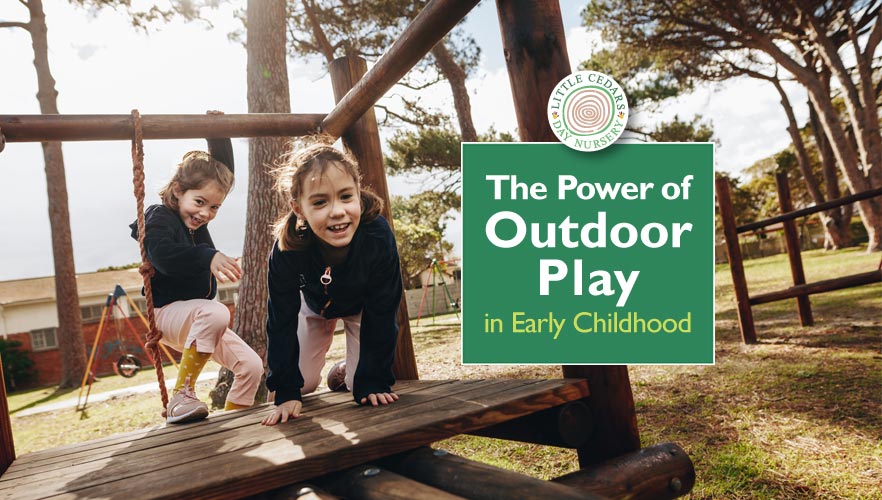
 In today’s guide, we take a close look at the incredible importance of outdoor play for children, including those under five. Outdoor play isn’t just about fun; it’s one of the cornerstones of childhood learning and development and has an immense number of benefits for little ones. So, in this comprehensive article, we’ll explore why outdoor play is so essential for our youngsters and how its effects can be transformative. Let’s take a look…
In today’s guide, we take a close look at the incredible importance of outdoor play for children, including those under five. Outdoor play isn’t just about fun; it’s one of the cornerstones of childhood learning and development and has an immense number of benefits for little ones. So, in this comprehensive article, we’ll explore why outdoor play is so essential for our youngsters and how its effects can be transformative. Let’s take a look… For children, the outdoors represents a magical place where fun, exploration and real adventure can take place. Picture a world where a simple stick can become a wizard’s wand, or a puddle can transform into a treasure-filled lagoon, and you’ll soon understand how exciting the outdoors can be for children. Indeed, outdoor play is the realm of limitless imagination. It offers children a vast canvas in which to immerse themselves into adventures, fostering creativity and igniting their instinctive curiosity.
For children, the outdoors represents a magical place where fun, exploration and real adventure can take place. Picture a world where a simple stick can become a wizard’s wand, or a puddle can transform into a treasure-filled lagoon, and you’ll soon understand how exciting the outdoors can be for children. Indeed, outdoor play is the realm of limitless imagination. It offers children a vast canvas in which to immerse themselves into adventures, fostering creativity and igniting their instinctive curiosity. The Great Outdoors serves as a natural classroom, with true hands-on learning experiences that provide numerous opportunities for children to acquire new skills and knowledge. Whether it’s
The Great Outdoors serves as a natural classroom, with true hands-on learning experiences that provide numerous opportunities for children to acquire new skills and knowledge. Whether it’s  Outdoor play engages all the senses and
Outdoor play engages all the senses and  The outdoors serves as an exceptional classroom. When they’re playing outside, children effortlessly absorb knowledge about the world around them. In the open air, they will naturally learn about nature, seasons, different types of flora and fauna, and how the environment functions. It is true learning through discovery.
The outdoors serves as an exceptional classroom. When they’re playing outside, children effortlessly absorb knowledge about the world around them. In the open air, they will naturally learn about nature, seasons, different types of flora and fauna, and how the environment functions. It is true learning through discovery.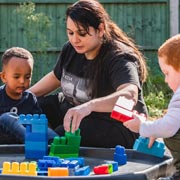 The open spaces of the outdoors also serve as a wonderful canvas for creativity. Children’s imaginations run wild outdoors as they invent games, stories, and art inspired by the natural world. Outdoor play encourages them to think in new, innovative, ways and to truly embrace their creative potential.
The open spaces of the outdoors also serve as a wonderful canvas for creativity. Children’s imaginations run wild outdoors as they invent games, stories, and art inspired by the natural world. Outdoor play encourages them to think in new, innovative, ways and to truly embrace their creative potential.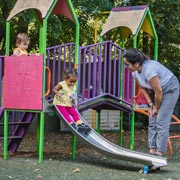 At Little Cedars Nursery, we really understand the profound impact that outdoor play has on early childhood development. With that in mind, our childcare practitioners ensure that children are given every opportunity to immerse themselves in a wide range of outdoor activities that help to nurture every child’s learning, growth, curiosity, and resilience. And let’s not forget one more important factor about outdoor play — it’s simply immense fun for children! As such, it is a perfect way to facilitate learning in the most natural way of all — through play.
At Little Cedars Nursery, we really understand the profound impact that outdoor play has on early childhood development. With that in mind, our childcare practitioners ensure that children are given every opportunity to immerse themselves in a wide range of outdoor activities that help to nurture every child’s learning, growth, curiosity, and resilience. And let’s not forget one more important factor about outdoor play — it’s simply immense fun for children! As such, it is a perfect way to facilitate learning in the most natural way of all — through play.
 As parents and caregivers, we understand
As parents and caregivers, we understand  Boundaries create a sense of security. Ensure boundaries are understood and that play areas have clear markers. Guide children to understand and respect these boundaries to reduce the risk of children wandering away — and potentially becoming lost.
Boundaries create a sense of security. Ensure boundaries are understood and that play areas have clear markers. Guide children to understand and respect these boundaries to reduce the risk of children wandering away — and potentially becoming lost. Children are naturally drawn to water, but it can pose significant risks. Ensure that play areas are far from water bodies, and when near any water source, always provide direct and continuous supervision. Even shallow water can be dangerous for little ones.
Children are naturally drawn to water, but it can pose significant risks. Ensure that play areas are far from water bodies, and when near any water source, always provide direct and continuous supervision. Even shallow water can be dangerous for little ones. Although they’re young, children want to explore and will naturally want to climb as they get older. It’s therefore important to teach children a safe approach to climbing. This should include emphasising the importance of staying within safe heights to prevent falls, assisting with climbing technique and, of course, risk-assessing what they should and shouldn’t attempt to climb in the first place.
Although they’re young, children want to explore and will naturally want to climb as they get older. It’s therefore important to teach children a safe approach to climbing. This should include emphasising the importance of staying within safe heights to prevent falls, assisting with climbing technique and, of course, risk-assessing what they should and shouldn’t attempt to climb in the first place. While exploring nature is exciting, it’s essential to be aware of potential dangers. Educate your child about the dangers of poisonous plants and fungi or insects that could harm them. Encourage them not to touch or eat anything unfamiliar.
While exploring nature is exciting, it’s essential to be aware of potential dangers. Educate your child about the dangers of poisonous plants and fungi or insects that could harm them. Encourage them not to touch or eat anything unfamiliar. Outdoor exploration sometimes involves contact with dirt and mud. Promote hygiene by ensuring handwashing facilities are readily available and teaching children the importance of cleanliness after outdoor play.
Outdoor exploration sometimes involves contact with dirt and mud. Promote hygiene by ensuring handwashing facilities are readily available and teaching children the importance of cleanliness after outdoor play.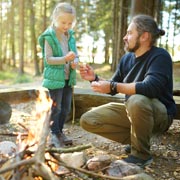 Campfire stories can be delightful and intriguing for children, but we must always prioritise fire safety. If you decide to expose them to it, children must be educated about the potential dangers of fire and always supervised during any fire-related activities. Fostering a responsible understanding around fire safety is paramount.
Campfire stories can be delightful and intriguing for children, but we must always prioritise fire safety. If you decide to expose them to it, children must be educated about the potential dangers of fire and always supervised during any fire-related activities. Fostering a responsible understanding around fire safety is paramount.
 Today’s minibeast-spotting activity is the third in a series of nature-based children’s activities and, like the others, comes with a free poster. As with the
Today’s minibeast-spotting activity is the third in a series of nature-based children’s activities and, like the others, comes with a free poster. As with the 
